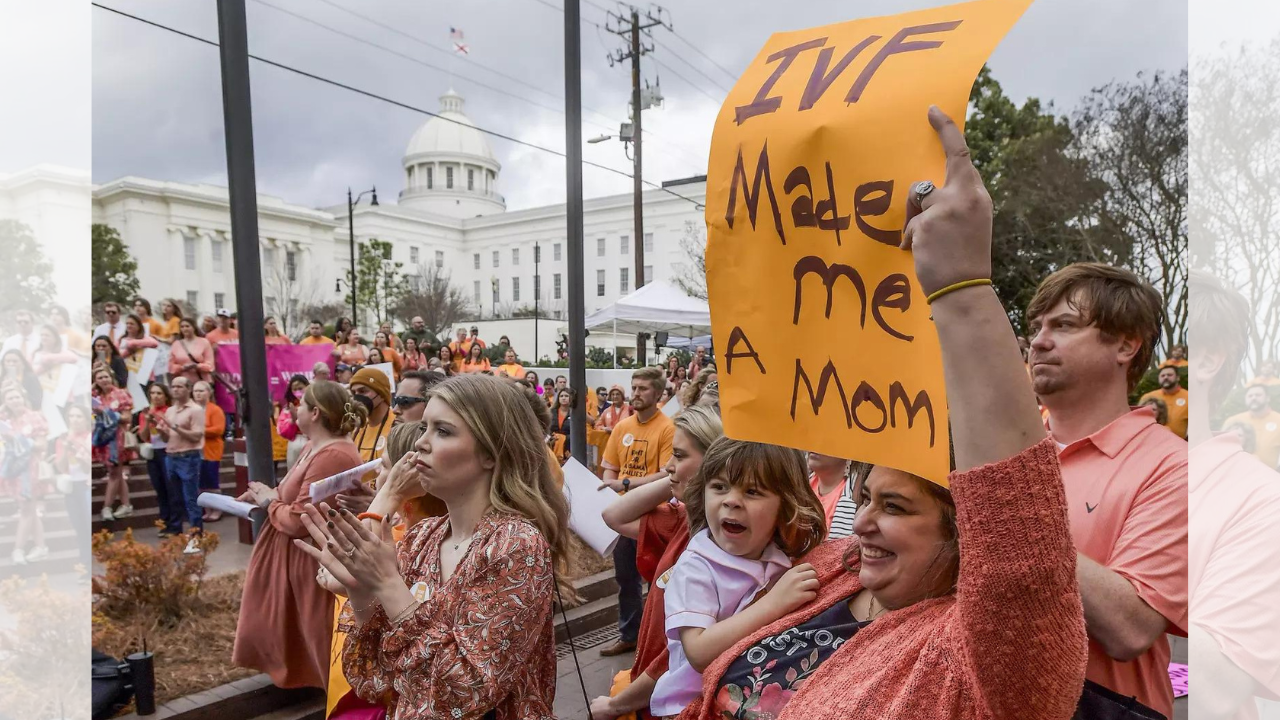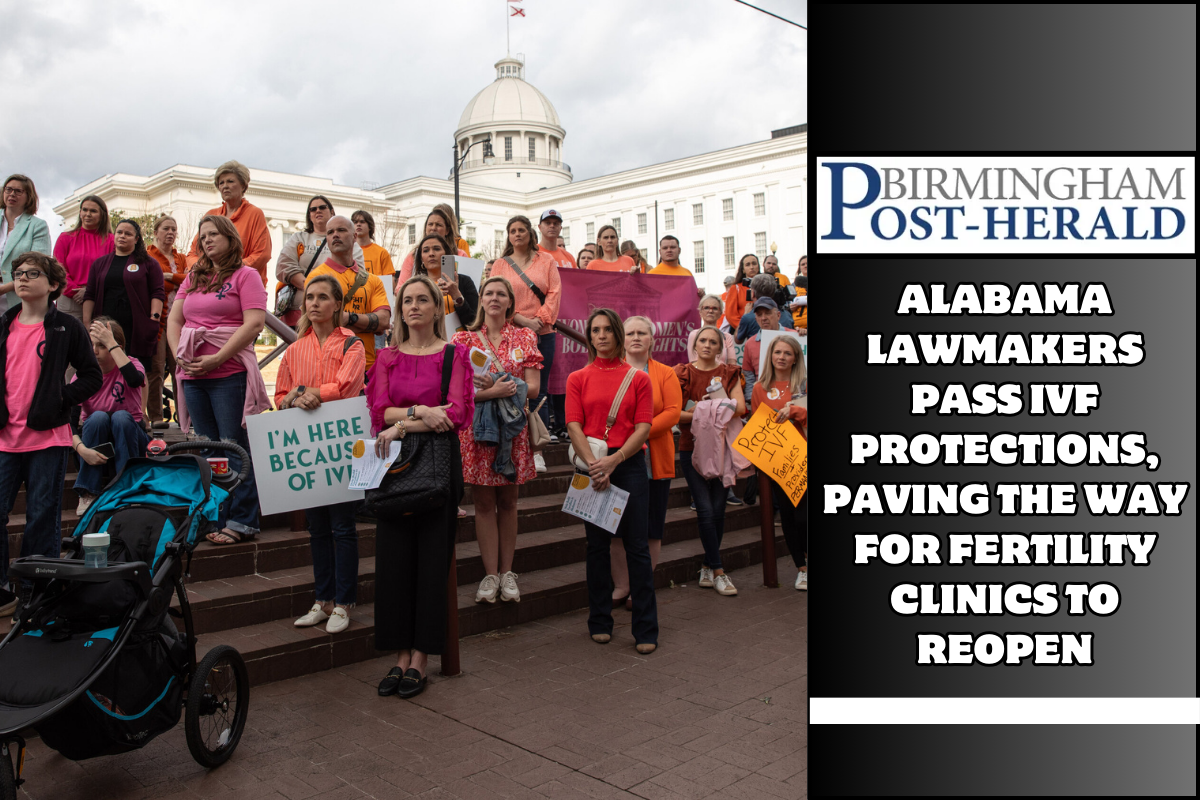Alabama lawmakers pass IVF protections, paving the way for fertility clinics to reopen:-MONTGOMERY, AL— On Wednesday, Alabama lawmakers gave final approval to a bill that will protect IVF doctors and patients. This comes less than a month after the state’s highest court ruled that frozen embryos are legally protected as children, which changed the way fertility treatments work.
The bill was passed by a vote of 81 to 12 in the House, and 29 to 1 in the Senate.
Alabama lawmakers pass IVF protections, paving the way for fertility clinics to reopen
It was agreed upon by both parties that fertility centers and doctors are not responsible for any “death or damage to an embryo” that happens during the IVF process. If an embryo is destroyed, the only legal option is to file a civil lawsuit against companies that make products used in IVF. In this case, the amount of money that families would get back would depend on how much they paid for the fertilization process.
On February 16, the Alabama Supreme Court said that human embryos outside of the womb have the same rights and protections as children. This started the ongoing IVF discussion.
The decision brought attention to the state across the country and made politicians, both Republicans and Democrats, scramble to find a way to fix the problem. The bill moved quickly through the statehouse, and Republican Alabama Gov. Kay Ivey signed it into law right away.
Three of Alabama’s biggest IVF clinics temporarily shut down a week after the decision out of fear of being charged. Politicians from all over Alabama and the country started to back IVF. These politicians included President Joe Biden, Vice President Kamala Harris, and former President Donald Trump.
Health and Human Services Secretary Xavier Becerra was sent to Alabama by the Biden government to deal with the problem.
“I think it’s become clear that this isn’t just about abortion,” said Becerra. “Roe would not have permitted this.”
Impact on IVF doctors and families
The IVF community was in a state of panic in the days after the court’s ruling. Women who were actively seeking IVF didn’t know if they could keep getting the treatments they had already paid for or if they would have to look for new doctors in another state.
Dr. Michael Allemand of Alabama Fertility, one of the offices that stopped working, said that patients were calling him all the time to ask what they should do. He wasn’t sure what to say. He was also one of several fertility doctors who were in the Senate on Wednesday for the vote.
He told the Montgomery Advertiser last month, “These people have a right to care, and just because they live in the state of Alabama doesn’t mean they should get bad care.” “We take great pride in what we do and how we do it for our patients.”
Ashley Stork, a patient at Alabama Fertility, said she was glad that her last egg transfer happened right before the Supreme Court case.
“We’re just really, really prayerful that this cycle works,” she stated. “And that our laws are able to change quickly.”

Also Read:-‘I am losing my mind’: Behind the big job numbers, Americans are struggling to find work
The court case that started it all
The first decision came from a case in South Alabama. A person at the Mobile Infirmary Medical Center was walking around an area he wasn’t supposed to be in when he came across three families’ frozen embryos. They were no longer alive after the patient dropped them to the ground.
There were three couples whose embryos were taken by the medical center and their IVF clinic, The Center for Reproductive Medicine. They sued for wrongful death.
A lower court said that rights against wrongful death did not apply to embryos that had been frozen, but the Alabama Supreme Court did not agree.
In his ruling on the case, Alabama Supreme Court Justice Jay Mitchell talked a lot about God, Christianity, and the Bible. All but Justice Greg Cook of the Alabama Supreme Court agreed with Mitchell.
Placing Alabama and IVF in national spotlight
Some doctors were afraid that Alabama would be the first state to make it harder to get IVF after the February ruling. This was especially true after the U.S. Supreme Court’s choice to overturn Roe v. Wade, the landmark abortion case. Alabama has a strict rule against abortion, just like other conservative states.
According to Dr. Natalie Crawford, owner of a fertility practice, “just like with abortion restrictions, when something is put forward in one state and is accepted there, other states are trying to bring similar cases and similar legislation to the table.” This makes Dr. Crawford and her team worry that it will spread to other red states.
Since then, lawmakers all over the country have started to talk about what will happen to IVF? After the national attention on Alabama, lawmakers in Florida put on hold a bill that would have let people sue for civil damages when a “unborn child” died because of someone else’s carelessness.
But this week in Tennessee, Republican lawmakers stopped a bill that would have made legal rights for birth control and IVF treatments, saying the state did not need them.
As for federal protections, it’s still not clear if the GOP senators who have spoken out in support of IVF in recent weeks will back the legislation from Senate Democrats.
Criticisms of Alabama’s legislation
Some people, like lawyer Sarah London, have said that the IVF bill could make things “potentially dangerous for patients.” London has helped clients with many women’s health cases. In one case, the plaintiffs said that a medical supply company’s defective product killed over 100 eggs.
“It is vital to protect access, but we should not give complete immunity to the fertility industry and wipe out critical protections for women undergoing IVF treatment,” London stated. “When the industry fails to live up to minimum safety standards and the promises made to hopeful parents, we need to ensure there is a pathway to accountability.”
There were several Democratic representatives who spoke out against the bill before it was passed. They said it was poorly written and didn’t follow the state’s definition of a kid.
This term is used in Alabama Code to include “an unborn child in utero at any stage of development, regardless of viability.” Rep. Christopher England, D-Tuscaloosa, Alabama, said the bill makes things worse instead of better.
“It’s unfortunate what has happened, but this is a really bad piece of legislation,” England stated. “What we’re doing right now is just trying to play lawsuit whack-a-mole.”
He said it was against the Constitution to give doctors “blanket authority” to kill embryos. He also said the bill applied the definition of a child in different ways to IVF and abortion. Representative Juandalynn Givan, D-Birmingham, Alabama, agreed with England that the bill makes a “special class of doctors.”
“To the IVF people, don’t tweet me, don’t call me, don’t email me to argue a point with me about this because I don’t want to hear it,” Givan stated. “This is a free-for-all for IVF doctors.”
